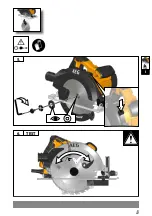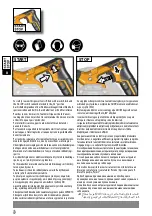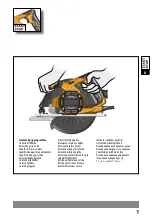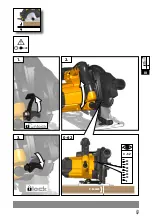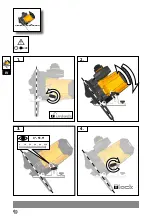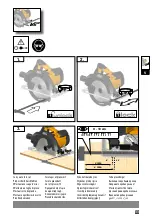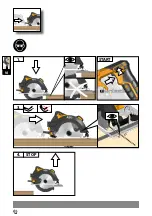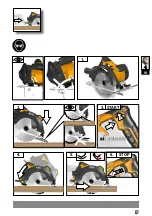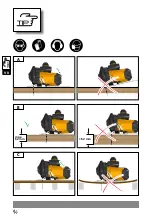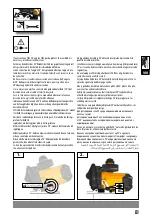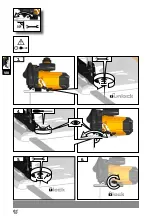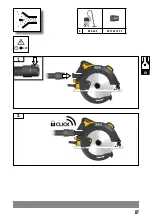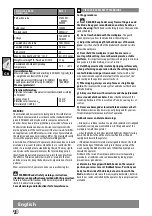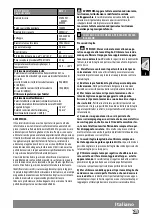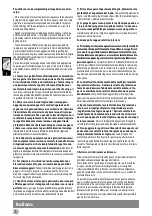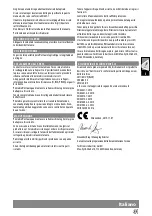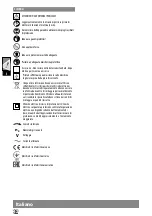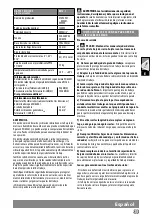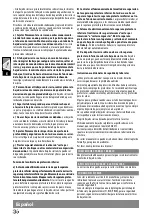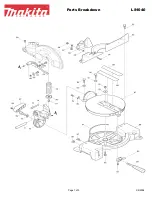
Deutsch
19
English
GB
b) When blade is binding, or when interrupting a cut for
any reason, release the trigger and hold the saw motionless
in the material until the blade comes to a complete stop.
Never attempt to remove the saw from the work or pull the
saw backward while the blade is in motion or kickback may
occur.
Investigate and take corrective actions to eliminate the cause
of blade binding.
c) When restarting a saw in the workpiece, centre the saw
blade in the kerf so that the saw teeth are not engaged into
the material.
If a saw blade binds, it may walk up or kickback from
the workpiece as the saw is restarted.
d) Support large panels to minimise the risk of blade
pinching and kickback.
Large panels tend to sag under their own
weight. Supports must be placed under the panel on both sides,
near the line of cut and near the edge of the panel.
e) Do not use dull or damaged blades.
Unsharpened or im-
properly set blades produce narrow kerf causing excessive friction,
blade binding and kickback.
f) Blade depth and bevel adjusting locking levers must be
tight and secure before making the cut.
If blade adjustment
shifts while cutting, it may cause binding and kickback.
g) Use extra caution when sawing into existing walls or
other blind areas.
The protruding blade may cut objects that can
cause kickback.
Lower guard function
a) Check the lower guard for proper closing before each use. Do
not operate the saw if the lower guard does not move freely and
close instantly. Never clamp or tie the lower guard into the open
position.
If the saw is accidentally dropped, the lower guard may
be bent. Raise the lower guard with the retracting handle and make
sure it moves freely and does not touch the blade or any other part,
in all angles and depths of cut.
b) Check the operation of the lower guard spring. If the
guard and the spring are not operating properly, they must
be serviced before use.
Lower guard may operate sluggishly due
to damaged parts, gummy deposits, or a build-up of debris.
c) The lower guard may be retracted manually only for
special cuts such as „plunge cuts“ and „compound cuts“.
Raise the lower guard by the retracting handle and as soon
as the blade enters the material, the lower guard must be
released.
For all other sawing, the lower guard should operate
automatically.
d) Always observe that the lower guard is covering the
blade before placing the saw down on bench or floor.
An
unprotected, coasting blade will cause the saw to walk backwards,
cutting whatever is in its path. Be aware of the time it takes for the
blade to stop after switch is released.
Additional Safety and Working Instructions
Wear ear protectors. Exposure to noise can cause hearing loss.
Use protective equipment. Always wear safety glasses when
working with the machine. The use of protective clothing is re-
commended, such as dust mask, protective gloves, sturdy non-slip
footwear, helmet and ear defenders.
The dust produced when using this tool may be harmful to health.
Do not inhale the dust. Use a dust absorption system and wear a
suitable dust protection mask. Remove deposited dust thoroughly,
e.g. with a vacuum cleaner.
Do not use saw blades not corresponding to the key data given in
these instructions for use.
It is necessary to select a saw blade which is suitable for the
material being cut.
Use only woodworking blades specified in this manual, which
comply with EN 847-1.
The rated speed of the accessory must be at least equal to the
maximum speed marked on the power tool.
Do not fix the on/off switch in the „on“ position when using the saw
hand-held.
Do not use abrasion discs in this machine!
WORKING INSTRUCTIONS
Adapt the feed speed to avoid overheating the blade tips.
SPECIFIED CONDITIONS OF USE
This electronic circular saw can cut lengthways and mitre accura-
tely in wood.
MAINS CONNECTION
Connect only to single-phase AC system voltage as indicated on
the rating plate. It is also possible to connect to sockets without an
earthing contact as the design conforms to safety class II.
Appliances used at many different locations including wet room
and open air must be connected via a residual current device (FI,
RCD, PRCD) of 30mA or less.
Always disconnect the plug from the socket before carrying out any
work on the machine.
Keep mains lead clear from working range of the machine. Always
lead the cable away behind you.
Before use check machine, cable, and plug for any damages or
material fatigue. Repairs should only be carried out by authorised
Service Agents.
MAINTENANCE
Always disconnect the plug from the socket before carrying out any
work on the machine.
If the replacement of the supply cord is necessary, this has to be
done by the manufacturer or his agent in order to avoid a safety
hazard.
Be sure to disconnect the tool from the power supply before
attaching or removing the saw blade.
Clean tool and guarding system with dry cloth.
Certain cleaning agents and solvents are harmful to plastics and
other insulated parts.
Keep the apparatus handle clean, dry and free of spilt oil or grease.
Check the function of guards.
Regular maintenance and cleaning provide for a long service life
and safe handling.
The ventilation slots of the machine must be kept clear at all times.
Remove dust regularly. Remove the sawdust which has accummu-
lated inside the saw in order to avoid the risk of fire.
Summary of Contents for KS12-1
Page 5: ...3 1 2 2 1 I ...
Page 6: ...4 3 EN 847 1 4 I ...
Page 7: ...5 5 6 TEST 2 2 x 1 I ...
Page 11: ...9 1 3 0 62 mm 0 62 2 III 0 62 40 30 20 10 0 50 60 ...
Page 12: ...10 3 1 4 2 IV 50 45 40 30 10 20 0 50 45 40 30 10 20 0 0 51 5 0 10 20 30 40 51 5 ...
Page 14: ...12 START 2 1 1 2 3 4 STOP VI 45 0 ...
Page 15: ...13 VI 2 5 2 4 0 0 1 3 2 1 START 6 1 STOP ...
Page 16: ...14 VII max 62 mm 62 mm A B C ...
Page 18: ...16 VIII 5 3 90 6 4 ...

